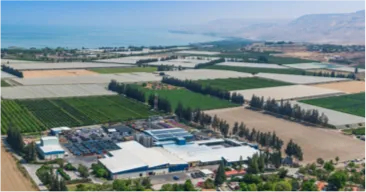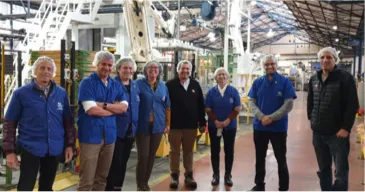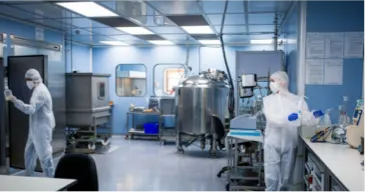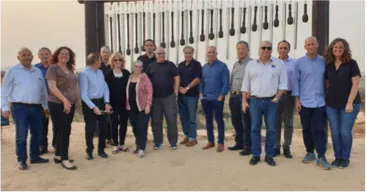About KIA
The Kibbutz Industry Association unites 250 Kibbutz and collective settlement factories that make up 10% of the national industrial sales. The KIA works to promote the industry in Israel in collaboration with the Israel Industrial Association and represents the Kibbutz industries and factories in national establishments including farming and economic. The KIA activities are divided into three pillars: Human Development, Global Activities, and Innovation and Enterernurialship whose goal is to unite the factories and create opportunities for a better future. The KIA was established in 1962 with over 70% of its presence is in the periphery bridging over the central district with the peripheral.
The Kibbutz Agri-tech solutions have been implemented in diverse agriculture fields in Israel as well as worldwide, supporting Sustainability and additional Global Goals like Water Purification, development of infrastructure and fighting Desertification and World Hunger. Innovation and cutting-edge technologies are utilized and implemented into the supply chain and production floor for many years, creating vibrant and successful companies, of which most work in a cooperative business model.
KIA in collaboration with the Manufacturer's Association of Israel, work to promote the overall industry in Israel and represents KIA's factories in relevant government bodies including the economic and industrial sectors. KIA's activities
are focused on three main pillars: Innovation and entrepreneurship, global markets, and human resource development.
Our main goal is to create business opportunities and connect the industry to a prosperous future.
The union was founded in 1962 with over 70% of its factories located in the periphery, thus providing a connection and bridge between the center and the periphery.
2022
The Kibbutz Industry Association announces: e-Good Jobs - a combined move to help factories solve the human resource problem. Innovation Leaders Course - To promote
2021
The total sales of the kibbutz industry exceeds the NIS 50 billion
2019
Opening the School for Future Women CEOs in collaboration with the kibbutz movement and the Sopranos community founded by Hannah Radu
2018
First Woman CEO of the Kibbutz Industry Association - Miriam Druck from Kibbutz Yakum
2018
Under the leadership of the association, an agreement was signed for the establishment of a permanent exhibition and a visitor center for agriculture and the
2014
The association is a partner with the KM"A Foundation in initiating and establishing the Kibbutz Nursery Fund, which is a business accelerator for locating and
2012
The union marks 50 years since its inception
2011
The Kibbutz Industrial Association is moving to a new home in the Manufacturers' House
2010
Signing of a merger agreement and joining the Kibbutz Industry Association as an independent association of the Manufacturers' Association
2005
Establishment of a public committee on R&D, exports and human resources to promote common issues that distinguish the kibbutz industry
2003
Sales for export, including overseas operations, pass sales to the domestic market and constitute over 50% of sales. Overseas production activity constitutes 10% of the
2001
The union is leading a struggle to keep kibbutz industrial plants on the map of the periphery and extend their eligibility for capital investment incentive
2000
The "Accession Treaty" of the Kibbutz Industrial Association is signed to the Manufacturers' Association
1996
The Entrepreneurship and Small Business section opens. The association "enters" the Internet "for the purposes of marketing the factories and gathering knowledge about the world"
1995
The union transforms from a unit in the kibbutz movement into a company Ltd. The union begins with a computerized distribution of tenders to factories.
1993
The first 25 collective enterprises are certified according to international ISO standards. 150 factories have boards of directors
1991
The union opens a representative office in Moscow to promote the export of kibbutz industry to Eastern Europe. Establishment of the section for the absorption
1988
The number of enterprises in the union exceeds 300. Kibbutz industry exports cross the $ 1 billion mark
1987
The union issues bonds and raises NIS 32 million that were made available to enterprises in difficulty.
The union initiates the establishment of a joint warehouse
1985
The association joins the Agritech Association, which works to promote all agricultural industry companies in Israel
1984
Activity related to the utilization of agricultural waste, the volume of its application company in Betzet is sold to a commercial entity
1981
The number of factories located has exceeded 200. 50 of them are over $ 1 million each. A delegation from the union participates in the
1979
Within the association, there are 7 clubs, stationery and office equipment, gems, irrigation manufacturers, textile manufacturers, optics manufacturers, kibbutz furniture
1978
The International Conference on Quality of Life initiated and produced by the Kibbutz Industry Association
1976
The plastics industry is becoming the largest industry in the union
1975
Establishment of the Kibbutz Institute for Research and Development within the framework of the Kibbutz Industry Association
1974
Kibbutz industry sales exceed the billion mark. Israeli pound
1973
Establishment of a fund for industrial plants beginning with the working class settlement.
1971

Publication of the first annual review of the Kibbutz Industry Association.
1965
Sending a representative on behalf of the association abroad to encourage exports
1998

Support, assist and accompany in creating innovation centers based on industrial-agricultural-academic eco-system in the periphery of Israel.
2004

Support, assist and accompany in creating innovation centers based on industrial-agricultural-academic eco-system in the periphery of Israel.
2010

Support, assist and accompany in creating innovation centers based on industrial-agricultural-academic eco-system in the periphery of Israel.
About KIA

Ido Rodoy
Chairman of the Board

Gil Lin
CEO

Ronit Harel
Human Resource & Finance

Rafi Nevo
Technology, Innovation & Agriculture

Michal Tsoran
International Trade & BD

Shlomit Arbel
ESG and Information Director

Mati Ankri
Bookkeeper





